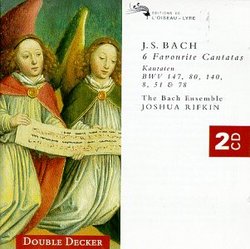| All Artists: Bach Ensemble Title: Bach: 6 Favourite Cantatas (BWV 147, 80, 140, 8, 51, 78) /Bach Ensemble * Rifkin Members Wishing: 1 Total Copies: 1 Label: Decca Release Date: 10/14/1997 Genre: Classical Styles: Opera & Classical Vocal, Historical Periods, Baroque (c.1600-1750) Number of Discs: 2 SwapaCD Credits: 2 UPC: 028945570624 |
Search - Bach Ensemble :: Bach: 6 Favourite Cantatas (BWV 147, 80, 140, 8, 51, 78) /Bach Ensemble * Rifkin
 | Bach Ensemble Bach: 6 Favourite Cantatas (BWV 147, 80, 140, 8, 51, 78) /Bach Ensemble * Rifkin Genre: Classical
![header=[] body=[This CD is available to be requested as disc only.]](/images/attributes/disc.png?v=430e6b0a) ![header=[] body=[This CD is unavailable to be requested with the disc and back insert at this time.]](/images/attributes/greyed_disc_back.png?v=430e6b0a) ![header=[] body=[This CD is available to be requested with the disc and front insert.]](/images/attributes/disc_front.png?v=430e6b0a) ![header=[] body=[This CD is unavailable to be requested with the disc, front and back inserts at this time.]](/images/attributes/greyed_disc_front_back.png?v=430e6b0a) |
Larger Image |
CD Details |
CD ReviewsImpressive and Affordable eido | 08/29/2000 (5 out of 5 stars) "The debate over the performance of J.S. Bach's cantatas boils down to the following: the evidence suggests that Bach only had one singer per part for performances of his cantatas. Thus, any historically accurate performance of these works will maintain the one-singer-per-part approach. At the same time, however, there is additional evidence that Bach wanted more performers. We are thus stuck with deciding whether Bach wrote for the musical forces he had on hand (which seems logical enough) or whether he composed for the performers he would like to have (which would seem silly, if he knew there would not be enough musicians to realize his intentions. On the other hand, Bach does make "solo" and "tutti" distinctions in the score... draw your own conclusions). Rifken is a strong supporter of the one-performer-per-part approach, which may seem a little sparse at first. Yet, when one listens to the various cantatas on these disks, one must confess that these sound, well, beautiful. This may not be an approach which would work for all of Bach's works, but the effectiveness on these disks certainly lends the interpretation validity. Regardless of where you fall-- and if you fall-- in the strenuous debates over historical performance, I would heartily recommend this disk. Not only are the performances polished, but the works themselves are exquisite-- a wonderful sampling of Bach's cantatas. (Personally I am addicted to the duet, "Wir eilen mit schwachen, doch emsigen Schritten" from BWV 74 which I could gladly listen to over and over-- listen to it and you will see why.)" Excellent 2-for-1 set (and one of a pair) eido | 06/30/1999 (4 out of 5 stars) "Not everyone agrees Rifkin is right about his one singer to a part approach to Bach but the clarity in the vocal line is a big improvement over the massed forces approach.This set is one of 2 budget double albums that Decca have compiled from 5 CDs issued on L'Oiseau Lyre 1987-91. Both double sets are well filled, give full notes and texts and sound quality is excellent. The other, 458087-2, contains Gottes Zeit, Aus der Tiefen, Was Gott tut ist wohlgetan on CD1 and three bass cantatas on CD2. If you only get the 12 cantatas on these 2 double sets you will still have a great selection of the best of Bach's output." Almost perfect, but... Stephen McLeod | New York, NY USA | 03/18/2007 (4 out of 5 stars) "Twenty years ago, Joshua Rifkin published the then controversial theory that Bach's cantatas were written with "one voice per part" (OVPP), i.e., the soloists also sang the choral parts. Evidently, this is no longer as controversial as it was in 1986 when these recordings were made. I don't know whether Rifkin is right, but his notes to the recording are persuasive, and I have since read much of Albert Durr's gigantic commentary on the cantatas, and Durr sees persuaded as well.
Good news: The music is translucent, the singing, for the most part, is excellent - especially soprano Julianne Baird on 4 of the six cantatas, and the great American bass, Jan Opalach on all except the solo soprano cantata, "Jauchzet Gott". The countertenor Allan Fast is excellent as well. The non-singing musicians play beautifully and Rifkin's direction makes the OVPP sound organic. Also, on two of the cantatas, tenor Frank Kelley deserves special mention for his heartbreaking rendition of his two major arias in those works. Jeffrey Thomas is excellent as well, although there's a brief moment of vocal failure in "Herz und Mund". Bad news: As reviewers have noted, the sound engineering, in too many places, is extremely distracting. "Liebster Gott" is one of my favorite of Bach's church cantatas, and the recording of it here reflects an unparalled musical sophistication and just plain beautiful singing. But there's a moment in the first bars of the 2d movement also recitative that I must literally turn down the volume so it won't hurt my ears. Additionally, soprano Jane Bryden and countertenor Drew Minter are decisively inferior to Julianne Baird and Allan Fast. The tenors each sing admirably, but Frank Kelley sings so poignantly, one wishes he was the only tenor here. However, Jeffrey Thomas acquits himself admirably throughout, and deserves special mention for his work on "Wachet Auf." These problems are disappointing and more frustrating because of the general excellence of the performances. Still, I can't stop listening. In retrospect, I don't know how I managed to miss this for so long. With small qualifications, I highly recommend this wonderful set." |

 Track Listings (24) - Disc #1
Track Listings (24) - Disc #1